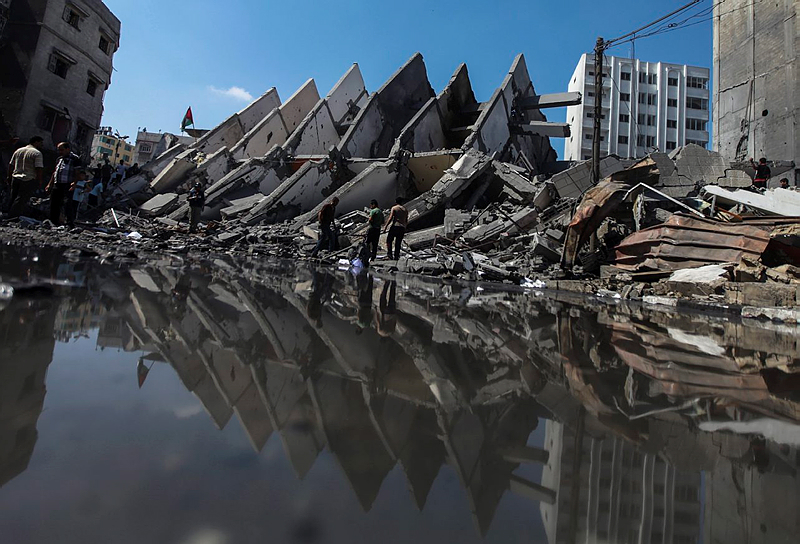While Israel enables the next phase of Gaza’s rebuilding after Operation Protective Edge, Egypt continues to plow through Gazan homes to create a security zone on its border with Gaza.
UN Special envoy Robert Serry announced on Saturday that under the trilateral agreement signed in September between Israel, the Palestinian Authority (PA) and the UN, widespread rebuilding efforts of Gaza will begin within the coming days, Ynet reports.
Israel agreed in September to establish a mechanism for rebuilding Gaza after this summer’s Operation Protective Edge, which caused widespread damage to the area. The agreement hinges on the reconstruction taking place under the supervision and control of the United Nations. Because of concerns that Hamas will use the materials to rebuild its terror infrastructure, Israel has demanded tight oversight of the process.
Israel has begun easing its restrictions on Gaza and allowing the entry of building materials as part of the plan to begin the rebuilding.
However, even as Israel eases its restrictions on Gaza, Egypt has tightened its grip. Last week, Egypt completely shut down the Rafah Crossing into Gaza as a result of the further deteriorating relations between the Egyptian government and Hamas.
Complete Shutdown on the Egyptian Side
Home demolition in the Egyptian city of Rafah near the border with southern Gaza Strip, on November 02, 2014. (Photo: Abed Rahim Khatib/Flash90)
The Palestinian Ma’an News Agency reported on Saturday that the Egyptian army has completed its clearing of the border area as part of its preparations to implement a 500-meter (550-yard) buffer zone along Egypt’s 13-kilometer (8-mile) border with Gaza.
According to the report, troops demolished about 800 houses in the area, erasing entire neighborhoods in the process. Reports have emerged in the past few days that the Egyptian army intends to double the depth of the security buffer zone.
“A decision was taken to increase the buffer zone along the border in Rafah to one kilometer. The decision… came after the discovery of underground tunnels with a total length of 800 to 1,000 meters,” the MENA news agency reported.
“Egypt is fighting a war of existence,” Egyptian President Abdel Fattah al-Sisi declared earlier this month. Egyptian authorities, like Israel, view the tunnels as a security threat and regularly destroy them.
Rebuilding What? Israel is Concerned
Hamas has reportedly already begun to rebuild its destroyed terror tunnels, and Defense Minister Moshe Ya’alon warned UN Secretary General Ban Ki-Moon that Israel will not provide building supplies intended for rehabilitating the Strip if Hamas will use them for terror tunnels.
Palestinian workers seen inside a smuggling tunnel dug beneath the Gaza-Egypt border in the southern Gaza Strip on October 13, 2013. (Photo: Abed Rahim Khatib / Flash90)
“We want the residents of Gaza to live in dignity and prosperity, rebuild their homes and return to normal life. But we are very worried. Just yesterday Hamas representatives said they intend to reconstruct the attack tunnels, instead of rebuilding the homes of Gaza’s residents,” Ya’alon told Ban. “If this is the case, we will not be able to allow the entrance of construction materials into Gaza. We will not allow Hamas to rearm itself.”
The monitoring of the process is enabled through the use of a GPS tracking system that maps the use of the materials in Gaza. International inspectors are in place to ensure that the materials are used solely for their intended civilian purpose. Additional inspectors are scheduled to arrive in the next few days, Ynet reports.
The UN envoy reportedly criticized the fact that countries that pledged to donate money for the construction of the Gaza Strip during the international donors conference in Cairo in October have not yet done so, and urged them to transfer the funds as quickly as possible.
Hamas has voiced opposition to the rehabilitation plan presented by the UN for the Gaza Strip. Speaking at the beginning of November, Hamas spokesman Sami Abu Zuhri called the UN mechanism to rebuild Gaza “unacceptable” and “inefficient.” Despite Hamas’s opposition to the system, Abu Zuhri gave no indication whether or not Hamas will try to disrupt the shipments.
How You Can Show Support for Israel
The people of Israel remain peace-loving and resilient in spite of all it has encountered over the summer, and recently in Jerusalem. Metal sculptor Yaron Bob provides a living example of one man turning the tools of terror into something beautiful. For years, he has collected the metal from Hamas rockets that have fallen in the Land of Israel, and molded them into sculptures, Menorahs and other collectible pieces. We here at United with Israel love his work, and think more people should know about it.
Click here to browse and purchase Rockets into Roses.
Author: United with Israel Staff
(With files from YNET)
